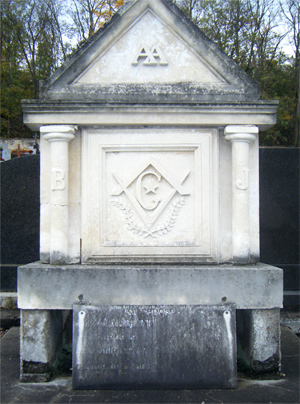Freemasons
It is also possible to make the mistake of confusing “Companions” of the Tour de France and Freemasons. The guilds and Freemasonry are, however, two very different associations, both in terms of their histories and their goals. Contrary to common belief, the guild movement was not an ancestor of Freemasonry, which was founded in England during the 17th century before establishing itself in France and elsewhere on the Continent in the 1730s. An initiatory, philosophical and fraternal association, Freemasonry uses the tools of the mason’s trade in a symbolic manner. A few Masonic symbols, rites and legendary references are found both in Freemasonry and in the guilds, but these are relatively rare. On the other hand, numerous guild members of the 19th century were affiliated with Masonic lodges, with the result that many Masonic rites and legends found their way into the guilds. Such as the three triangular points, the flaming star with five branches associated with the letter G, the legend of the architect Hiram, etc. On the other hand, the fact that the compass and the intersected square were common to the two institutions was not a matter of one organisation borrowing from the other.
Diplomas, items adorned with symbols and certain other attributes, such as scarves, may result in confusion. It should also be noted that the terms “Apprentice”, “Companion” and “Master” are used in Freemasonry to designate three ranks of Masons, but they have no relation to the internal organisation of the guilds, which has nothing to do with either the real or symbolic meanings of “apprenticeship” and “mastery”. Guild members were referred to only as “Aspirants” (or “Affiliates”), “Companions” and sometimes “Accomplished Companions”.
In reality, there were other terms to designate the advancement of a young worker within his society. These varied depending on era and society, and included Attendant, Society Member, Young Man, Aspirant, Affiliate, Novice, Postulant, Initiated Member, “Thanks-giver”, “Thanked Master”, not to mention their synonyms: rabbit, fox, book, wolf, dog, monkey, agrichon, etc.

